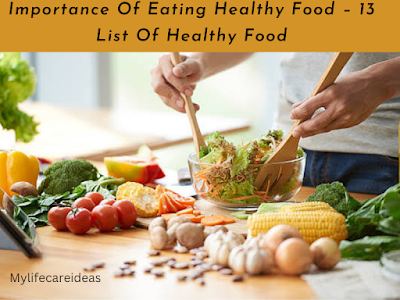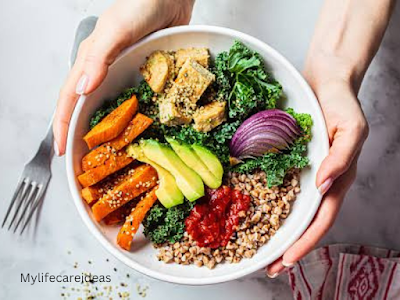What Is The Meaning Of Healthy Food?
Eating a range of foods that provide you with
the resources you have to preserve your health, feel well, and have energy is
known as healthy food eating. Some of these nutrients include water, vitamins,
minerals, protein, carbohydrates, and fat.
Everyone needs proper nutrition. Eating
correctly is a great strategy to help your health keep its strength and health
when combined with physical activity and keeping a healthy weight. Eating
healthfully is important for you if you have a breast cancer history or are
presently receiving treatment. Your immune system, your mindset, and your level
of energy can all be impacted by what you eat.
Importance Of Eating Healthy Food:
The organism must eat to survive. You can handle daily activities thanks to the nutrients you obtain from eating healthy food. But the role of diet goes much further than that. Recent developments in nutrition have made it possible for us to understand how important a proper diet is for promoting physical and mental health, preventing diseases, and generally enhancing our health and life quality.
How To Eat Healthy Food?
When it is made the claim that a diet must be
diverse, it usually refers to nutritious foods that make clear the value of
nutritious food. In other words, eat plenty of fruits, veggies, whole grains,
beans, fish, etc. This does not suggest that you should never eat something
that is outside of these restrictions. However, if we are only discussing the
significance of eating well, the foods must be nutritious.
In other words, although we are aware of the
significance of eating well, our attitude toward food still has to be changed.
The objective is to understand how to provide our body with the nutrition it
requires so that it may function properly and prevent diseases and maladies,
not reach a specific weight or keep to a set standard of beauty.
13 Healthy Foods List:
Some of the most healthy foods are following
there:
1- Fruits And Vegetables:
Making vegetables the star of your recipes is
the easiest way to boost your diet. They are a source of vitamins and minerals,
which are necessary for the body's healthy functioning, in well as being
lighter than other foods. Fruits may fill you up between meals or can be used
as a healthy alternative to pastries for breakfast. Keep in mind that eating
healthfully is important for both your appearance and self-care.
To encourage their intake, it is important to
include veggies in all meals, use fresh fruits and raw vegetables for snacks,
always select fruits and vegetables that are in season, and make sure there is
a variety.
2- Whole Grains:
In general, it refers to increasing the intake
of whole grains like rice, oats, rye, or spelled. Also wheat, it is better to
consume less of it and rely on healthy substitutes because it is a component of
almost everything we eat.
The inclusion of fiber in whole grains has the
benefit of making you feel fuller more quickly and promoting intestinal
transit. However, because our bodies to convert carbohydrates into glucose for
energy, you must adjust the amount you eat to your energy consumption.
3- Chicken:
Chicken is a cheap and nutritious meat.
Chicken that has been raised naturally is a superior protein source.
However, it's important to keep in mind that
how chicken is made and cooked has an impact on its nutritional value. This
implies limiting the consumption of deep-fried chicken and always removing the
skin before eating. Saturated fat is prevalent in chicken skin.
4- Eggs:
Because they are so adaptable, eggs are
another protein source that people may readily include in a healthy
food-balanced diet.
Two vitamins that are essential for
maintaining energy and producing red blood cells are found in eggs.
Additionally, eggs are a good source of leucine, an essential amino acid that
helps to promote the synthesis of muscle protein. Eggs are a good source of
choline as well, which is crucial for healthy cell membranes.
5- Fish:
Fish is another countable healthy food.
Salmon, trout, mackerel, herring, sardines, and anchovies are a few examples of
oily fish. These fish have oil in their stomach and surrounding tissues.
High quantities of omega-3 fatty acids are
present in their lean fillets. According to one study, these oils may be
beneficial for the heart and nervous system.
6- Peanuts:
Peanuts are a delightful, nutrient-dense meal
that is also high in antioxidants, despite not actually being nuts. Numerous
studies suggest that eating peanuts can aid with weight loss.
On the other, peanut butter is easy to eat in large quantities and has a high-calorie content, so if you're managing your calorie intake, you might want to be cautious about how much you eat.
Must read about the 12 Amazing Health Benefits Of Peanuts
7- Dairy:
For those who can stomach them, dairy products
provide a healthy source of several essential nutrients.
The most nutrient-dense choice appears to be
full-fat dairy, and research indicates that those who consume most full-fat
dairy had a lower risk of type 2 diabetes and obesity.
Because grass-fed dairy contains more
bioactive fatty acids like conjugated linoleic acid and vitamin K2, it may be
even more nutritious.
8- Carrots:
One well-liked root vegetable is the carrot.
They provide a great deal of fiber and vitamin K and are quite crispy. Carrots
are also rich in carotene antioxidants, which provide a lot of benefits.
Must Read about the 11 Amazing Health Benefits Of Carrots
9- Cucumber:
Cucumbers are among the most widely consumed
vegetables in the world. They are mostly made of water and have extremely
few calories and carbohydrates. However, some minerals, including vitamin K,
are present in little out in them.
Must read about the 12 Health Benefits Of Cucumber
10- Lentils:
Good quantities of fiber, magnesium, and
potassium are found in lentils.
They typically take a long time to cook. But
producers may sprout the seeds, turning them into a delectable, nutritious,
ready-to-eat snack.
A tasty and healthy snack can be made by
packing a container of sprouted lentils in a lunchbox or picnic basket along
with some chili powder or pepper for flavor.
11- Wheat Germ:
The portion of wheat that develops into a
plant is called the germ. In essence, it is a seed's embryo. Bran and germ are
byproducts of milling. Cereals' germ and bran components are frequently removed
during refining.
Whole grain products still contain the germ
and bran, nevertheless. They are therefore a healthy food choice.
12- Oatmeal:
According to research, the soluble fiber in
cereal lowers cholesterol and lowers cardiovascular risk factors.
Water-soluble fiber and complex carbohydrates
are both present in oats. These sluggish down digestion help control blood
sugar levels. In addition, oatmeal is a good source of potassium and folate.
13- Avocados:
Because avocados contain a lot of fat, some
individuals avoid eating them. Avocados, on the other hand, offer wholesome
fats in addition to B vitamins, vitamin K, and vitamin E. A good source of
fiber is avocados.
Avocados may also possess anti-cancer
qualities. In a study with avocados, it was found that colored avocado seed
extract decreased the viability of cancer cells in the breast, colon, and
prostate. The study, however, did not say whether or not the outcomes would be
similar among people.






0 Comments